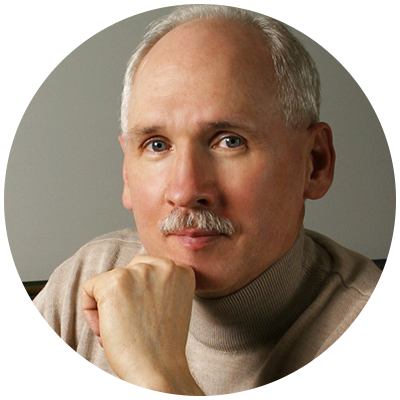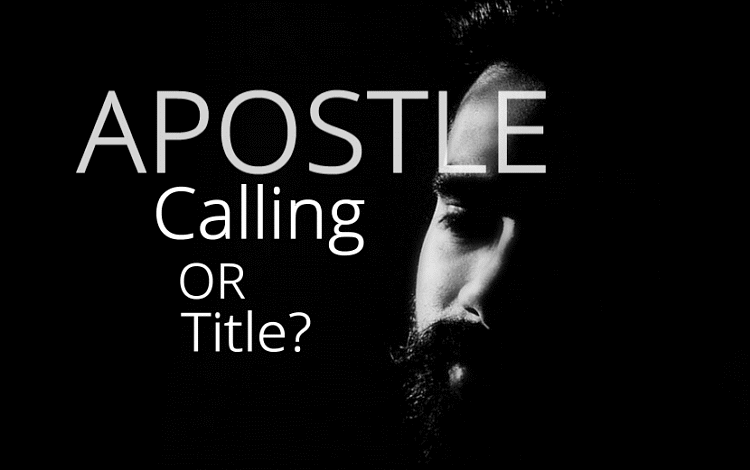
Author:
Apostle Eric vonAnderseck
Eric serves as a called and confirmed Chief Apostle in the restored government of God. He is the founder of s8w Ministries, and it is through his stewardship that God ushered in a new season of restoration for all believers who desire to walk in the fulness of Christ. View my profile.
The church has entered into a new apostolic age and its understandable that believers and ministers have questions about the use of the calling. Some are very irked that I would set the calling alongside my name.
When the apostolic office is defined as a term rather than a calling one’s thinking is in line with the honor of this world and to them it looks like a proud thing to do to let it be known that you are an apostle.
In a recent article posted in Charisma magazine a minister again vented his anger saying in essence that if you are an apostle you don’t need to tell anyone about it. He went so far as to say that Paul, rather than mention that he was an apostle, identified himself as a sinner.
In the mind of this minister true humility is to point towards one’s former alliances in the kingdom of darkness than to point to Christ. So he has multiple flaws in his thinking that God is setting straight.

The Apostolic Calling Is Of Grace
First of all, in the world your place and status in society is dependent upon the elevation of your position and how you convey that to others, but it is not so in Christ. In the kingdom of God your place in Christ is dependent upon the measure of grace whereby you serve Him and the body.
Another thing to keep in mind is that the calling of apostle is not a rank, but rather a responsibility. The carnal minded are fearful that someone is trying to “outrank” them and so object to God bringing forth His true apostles.
In the kingdoms of this world the one-upmanship is a finely honed skill that calls upon these three kingpins: the aspiration, the principle, and the imagination. These three ruling powers dictate to the natural man to keep alive man’s dream to preserve himself rather than labor in the kingdom of God to glorify Him.
Ministers have not been able to escape the inertia of the natural man and fear the trio and their devastating power and hold they have over them. In that they have not been in contact with God’s true apostles they do not have the restored foundation of truth laid within their hearts and do not have the spiritual tools of Christ to overcome these threats.
You will find that those who cry out the loudest against the renewal of the apostolic calling are those who are the most fearful of losing themselves to their own aspiration, principle, and imagination. They try to find strength in false piety and false holiness, and God is removing these false tokens, for they do not represent Christ.
The true apostolic calling carries the grace of God, not the aspiration of man. Fear is not a good protector, my friend. Fearing one’s aspiration and pride does not permit the grace and peace of God to rule the heart.
God’s Rendering of the Apostolic Calling
Acts 14:14
“Which when the apostles, Barnabas and Paul, heard of, they rent their clothes, and ran in among the people, crying out.”
Underline the word “apostles” in the above verse. We see that the Holy Spirit identifies to the church the calling God placed upon Paul and Barnabas. The Holy Spirit did not say, “Which when the sinners, Barnabas and Paul, heard of…” No. That would not make sense would it, to replace the word “apostle” with the word “sinner”. You must know that God does not identify the apostolic calling with the kingdom of darkness.
Acts 15:2
“When therefore Paul and Barnabas had no small dissension and disputation with them, they determined that Paul and Barnabas, and certain other of them, should go up to Jerusalem unto the apostles and elders about this question.”
Again, underline the word “apostles” in the above verse and note how the Spirit of God highlights for us the calling that He placed upon Paul and Barnabas as a pattern for the church to follow—to recognize the calling. I want you to also see that the measure of grace given to the calling is to render an accurate knowledge of Christ to the body, and so here again we see God defining the role the apostle plays in the church.
The Holy Spirit did not say that they, “should go up to Jerusalem unto the sinners and elders about this question,” but rather to the apostles and elders. The elders were those saints who were also confirmed into their calling (apostles, prophets, evangelists, pastors, and teachers).
Paul An Apostle
I want to show you from the scriptures how the Holy Spirit taught Paul to render his calling. Romans 1:1, “Paul, a servant of Jesus Christ, called to be an apostle, separated unto the gospel of God.”
Paul did not hide his calling as some claim I should do. Nor did Paul identify himself as a sinner. He was not called to be a sinner, but called to be an apostle. You will note that the Holy Spirit led Apostle Paul to begin most of his epistles with this declaration of his calling and we’ll look at why he was faithful to do so in a moment.
1 Corinthians 1:1
“Paul called to be an apostle of Jesus Christ through the will of God, and Sosthenes our brother.”
2 Corinthians 1:1
“Paul, an apostle of Jesus Christ by the will of God, and Timothy our brother, unto the church of God which is at Corinth, with all the saints which are in all Achaia.”
Galatians 1:1
“Paul, an apostle, (not of men, neither by man, but by Jesus Christ, and God the Father, who raised him from the dead;)”
Ephesians 1:1
“Paul, an apostle of Jesus Christ by the will of God, to the saints which are at Ephesus, and to the faithful in Christ Jesus.”
Colossians 1:1
“Paul, an apostle of Jesus Christ by the will of God, and Timotheus our brother.”
A carnal minded minister will look at these statements from Apostle Paul and get riled up, and say, “Stopping calling yourself an apostle. You should not require this title. You don’t have to use the word “apostle” with your name. You must be proud.”
No, Apostle Paul is not proud, but rather has humbled himself to the grace of God to become servant to it. The following excerpt from my new book, The Apostolic Calling & Anointing will assist you further.
Chapter 16: The Authority Of The Apostolic Calling
“In this chapter I want us to observe how Apostle Paul began his epistles to the church. Did he try to hide his calling as many false apostles today try to do, pretending that this is a sign of humility?
“Here we’re disambiguating again, aren’t we? When the calling of the apostle was thought to be a position of authority according to the perception of the flesh, the carnal minded fought back saying, “We have to be humble. We can’t actually say we are apostles, even though we believe God called us to that office.”
“In their mind the calling was a title of importance, and that stirred up a vulnerability to want to protect themselves from the principle of man. But the calling is not a title that comes from the principle of man, it is the authority of grace that comes from the throne of God. When you accept God’s definition and purpose for an apostle, you will cease to fight against God to retain your own integrity.
“There was a reason for God directing Apostle Paul to begin his epistles by identifying his calling. Let’s look at that in 2 Timothy chapter one verse one.
“Verse 1 – “Paul, an apostle of Jesus Christ by the will of God, according to the promise of life which is in Christ Jesus.”
“Paul, an apostle of Jesus Christ” Let’s look at that first. Paul, as his habit is, first identifies his calling. Paul does this to explain and expose the power of God that accompanies the calling. Paul is identifying that position as a steward. . .
“an Apostle of Jesus Christ”. Let’s now look at that. Paul identifies his calling with the name of Jesus Christ for the purpose of sanctification and to establish ownership. Sanctification has to do with God separating you from the world to Himself. He is taking ownership of you for the purpose of nurturing and preparing you for His grand plan—the eternal inheritance. Those who are outside of covenant will take ownership of Paul’s letters as they also take ownership of the Bible, but it is unsanctified ownership. Ownership has to be in His name—in the name of Jesus; that is sanctified ownership.
So Paul is identifying that position of stewardship for sanctification. And this is why Paul calls himself an Apostle of Jesus Christ. He stands in the sanctification of that name, not the name of Moses or of that law.
“by the will of God,”
When Paul says, “by the will of God,” he is identifying the power of the Spirit. He is also talking about our power of choice. We choose to join ourselves to our Creator through this sanctification, so he says, by the will of God, by this union and this joining.
“according to the promise of life, which is in Christ Jesus.”
The word “in” has to do with a point of access, and access speaks of the altar of the house. This speaks of your priesthood and the building of the house of the second covenant — the house of Jesus Christ. The promise of life is only in this because it is only in Him.
“You will not find the promise of life in the house of Baal. In the house of Baal are many unsanctified tokens, and the activity of that house builds man’s boast. Always remember that the boast of man never progresses, but always regresses into a form of regret; so we see in the house of Baal that preaching focuses on those things that man regrets.
“The unsanctified stewardship mixes the aspiration and boast of man with Christ. That is why it is the house of the mother of harlots (joined to many suitors for pleasure), the house of the hydra (many heads).
Our Genealogy Is Jesus Christ
“God will always bring the church back to identify the house of their true parentage, that we may identify Him. This is “distinction of face”. In the house of God there is distinction of face because there is a pure language, and there is an understanding of your function, so there is distinction of face. We know what relation we are of.
“Just like birds; when a bird’s eyes are opened he sees for the first time a reflection of what he is. So if he sees anything that is less than what his parent looks like then of course he says, “No, I am not part of your group, I am part of this group over here.”
“A sea gull when his eyes open sees the face of his mother. That image is burned within his mind concerning his house. And it is the same with us, when we are born again our eyes are opened by knowledge, we see the face of Christ, and we know who our parent is from that point on, so there is no confusion of face.
“The same is true for kittens or dogs. When puppies open their eyes for the first time they see who their parent is. Hopefully it will be your face. So when the little puppy’s eyes are opened, the first person they see they say, “Awww! I belong to you.” And you want to cuddle it and pet it, and there is no confusion of face. Your pet recognizes the one that took ownership of him.
“The sanctification of the calling is vital. If the knowledge the preacher shares is not Christ, then new born babes will not see the face of Christ when their eyes open, they will see the face of Baal or the many faces of the hydra. That is their parent—the knowledge they are born of.
“The chronicles in the book of Numbers illustrates this for us. You can see that the Jews were very accurate in their genealogy (which is distinction of face). When they came out of Egypt, God was bringing out His people to separate them from all other people to Himself. God gave them all one language of covenant to speak through Moses. They all embraced the same law, the same altar, the same faith. They were all of one house, the house of Moses.
“When the Jews wandered from the covenant of God they mixed with other nations. And as a result they learned their language and worshipped their gods. They spoke half the language of the house of Moses and half the language of Baal. The Spirit of the Lord brought this out through Nehemiah, “And their children spake half in the speech of Ashdod, and could not speak in the Jews’ language, but according to the language of each people,” Nehemiah 13:24. . .
“Sanctified stewardship brings you into your sanctification, that upon seeing the face of Christ, you may receive the blessing of His grace, mercy, and peace. This is what we see Paul saying to Timothy in verse 2: “grace, mercy, and peace, from God the Father and Christ Jesus our Lord”.
We partake of God’s grace, mercy, and peace now at the altar of Christ. The face of God (His countenance) is now seen in the covenant and tools of Jesus Christ, in these things. We receive the blessings of the inheritance and the blessings of this grace through this altar of Jesus Christ. This is where His face is. Because we see Him, we have His image burned within our understanding.
“This is the “authority of grace”. The knowledge of Christ that apostles teach the church carries His sanctification that they may see His face. Through the stewardship your sanctification remains sealed. Apart from it, the peace of God will not rule.
“Know this: God will not put His peace upon anything that is unsanctified. God puts his peace only upon those sanctified things. So here, Timothy is in recognition of this tethering, and Paul says, grace, mercy, and peace. So the revelation of God brings about this form of activity, which God sanctifies. His peace will rule. And we see that the tether is strong; it is from God the Father and Jesus Christ, or Christ Jesus our Lord.
“from God the Father and Christ Jesus our Lord”
From God the Father – shows us that He governs our destiny in this form of tethering and nurturing, that the witness the Father provides through the Spirit is superior to the record (Jesus Christ) because it is the empowerment of the record. Apart from the empowerment, the record is a dead letter.
“It’s like soil without moisture—it’s dead—called desert. It lays desolate. But when the moisture moves upon the sand, immediately life begins to spring up. So that which was desolate within you is now springing forth with life because of God’s sanctification. This tether exists because of your priesthood, and Timothy had an active priesthood.”





